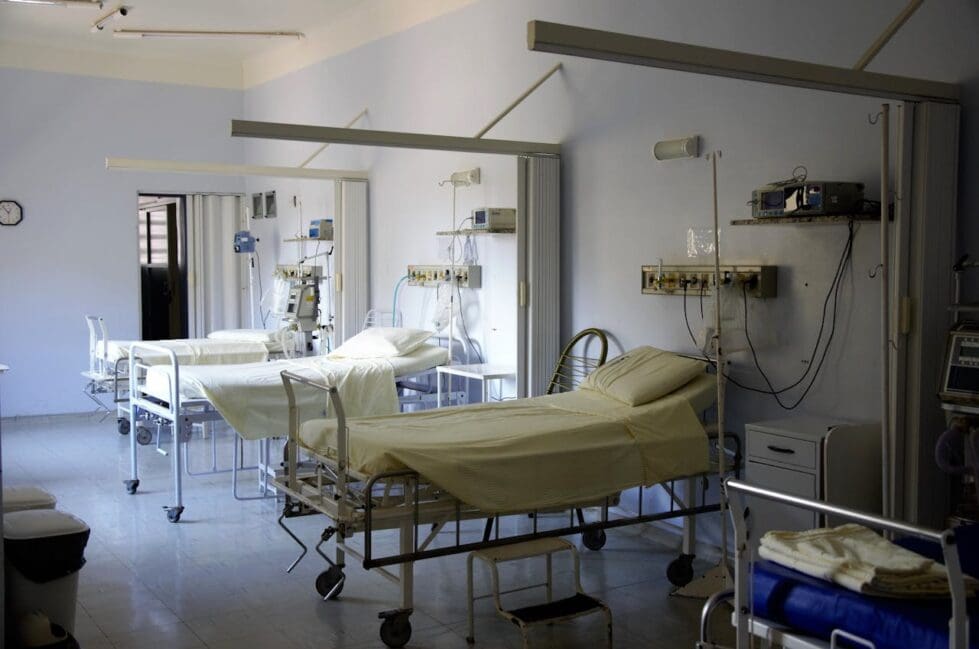

If a House Bill passes, all of Delaware’s hospitals will have to submit annual budgets to the state for approval and, possibly, change, including executive salaries. Photo by Pixabay/Pexels.
Delaware’s hospitals soon could be governed by a politically appointed state board charged with examining and approving hospital budgets and invested with the power to demand changes and punish those that don’t meet its guidelines.
House Bill 350 would create the Diamond State Hospital Cost Review Board under the Department of Health and Social Services. It will try to keep hospital budgets at or below increases of a state spending benchmark. Established in 2018, it was 3% to 3.8%, the amount tied to the state’s gross domestic product.


Valerie Longhurst
Until that board is up and running, it will immediately prevent hospitals from charging more than 250% of what Medicare allows, a move described as a temporary price control measure by Brian Frazee, CEO of the Delaware Healthcare Association, a trade organization of hospitals and other organizations.
“Make no mistake, this would limit access to care, especially with a $360 million cut across the entire system,” he said.
At a minimum, it will mean shorter staffing hours and longer waits for some services consumers can now easily access, he said.
Speaker of the House Valerie Longhurst, D-Bear, main sponsor of the bill, now styled as House Substitute 1 for House Bill 350 because of changes, said the board is needed for a long list of reasons, including:
- Hospitals represent 42% of all healthcare costs in Delaware;
- Hospitals never met that benchmark, except for that first year of the pandemic;
- Inpatient and outpatient costs at Delaware hospitals totaled $3.5 billion in 2021, although hospitals tie that to patients seeking care they put off because of the pandemic;
- Delaware hospitals profit $2,006 per patient, a full 40.5% higher than the national average of $1,331.
“These costs are unsustainable for working families in Delaware,” she said in a statement announcing she was moving forward with the bill.
Frazee said Longhurst’s bill will give the state and a five-member board appointed by the governor, speaker of the house and senate president pro tempore, the ability to override the hospital systems’ local board of directors.
It’s short-sighted because it singles out one group of healthcare deliverers and doesn’t consider the effect of webs of partnerships, the influence of insurance companies, other government programs, the rise for the demand in care after the pandemic and the shock of inflation, all while being based on a benchmark he says is flawed.
“We think there are better ways, better paths forward in terms of addressing all of our shared concerns around health care costs,” Frazee said, “without really threatening the very foundation of our healthcare system here in Delaware.”
Hospitals propose alternatives
Earlier this week, the association and others met with Longhurst, representatives of the governor’s office and other supporters of the bill and offered three alternatives for their consideration.
He declined to detail any of the plans, in order to give the supporters time to consider the choices.


Brian Frazee
“We had a productive meeting,” he said Friday morning. “Those alternatives aim to address their concerns around cost and transparency while also establishing a longer term collaborative effort that brings everyone to the table to find solutions that not only improve affordability but also Delaware’s healthcare delivery system more broadly.”
Republican legislators — generally champions of a free market — are horrified at HB 350.
“This bill proposes a disturbing shift, giving government the power to dictate policy to an entire private sector category,” said Rep. Danny Short, R-Seaford.
He said he understands the concern and frustrations over the “unsustainable” rising rates of healthcare.
The state’s proposed $6.1 billion budget for fiscal year 2025, which starts July 1, includes $2 billion for healthcare costs, including Medicaid and insurance for state government employees and retirees. And the state is facing healthcare premiums rake hikes of 22% for 2025, partly because of the new weight loss drugs.
“If we want vibrant hospitals capable of delivering the best patient outcomes, we cannot hang this albatross of a law around their necks,” Short said. “It is a massive intrusion of government authority into the private sector, destined to fail in its laudable but doomed goals.”
Vermont’s board
While Longhurst said in her statement that other states have implemented similar legislative, Frazee said the bill is based solely on Vermont, the only state that has a board overseeing hospital budgets.
The Green Mountain Care Board also oversees insurance rate requests, budgets, accountable care organization budget and certification, capital projects requiring certificates of need and two major data sets.
The Vermont system is not appropriate for Delaware, Frazee said, offering a list of reasons:
- Vermont is largely a homogenous state, with 94% of its residents White. Delaware has a much more diverse population.
- Vermont is not gaining population, but Delaware is.
- Delaware is the first oldest state in the nation, partly because a chunk of Delaware’s new population is retirees attracted to the low property taxes and lack of sales tax.
“Out of everything they could have picked in the country, the Vermont model is the worst,” Frazee said.
The financial note attached to Longhurst’s bill says it will cost Delaware $$657,482 in 2025; $707,534 in 2026; and $711,639 in 2027. It includes two full-time fiscal and policy analysts and $500,000 of ongoing contractual support.
It does not mention salaries for members of its board.
While Vermont’s board has larger responsibilities, it also comes with some hefty salaries. Its chairman is paid the same as a superior judge, or $182,499, and board members are paid 2/3rds of that, or $121,680.
Vermont’s board is charged with reducing the per-capita rate of growth in expenditures for health services in Vermont across all payers while ensuring that access to care and quality of care are not compromised. It asked hospitals to keep a two year revenue growth at 8.6% or less.
In a May 2023 story, Vermont Public Radio said Southwestern Vermont Medical Center submitted a budget just slightly higher than the target, while Gifford Medical Center in Randolph kept its growth at 7.2%, well below the target.
They were the exception.
The University of Vermont Health Network, the state’s largest with three hospitals, said one of its hospitals needed more than 28% budget increase, over the two years, while another asked for nearly a 24% jump.
Short cited a 2022 Vermont Public Radio report that said “nine of the state’s 14 hospitals” were expected to lose money that year. Frazee said it’s now 11 of 14.
Delaware’s board
Under HB 350, the Diamond State Board will ask for hospital budgets that include projected expenditures and revenues; as well as spending and revenue data from that previous year.
“This board will bring transparency to our hospitals and allow the public to see where their billions of dollars are being spent,” Longhurst said in her statement. “Delawareans have the right to know that their money is going towards improving healthcare outcomes and not to executives, lawyers and accountants that have nothing to do with care delivery.”
According to her bill, though, while the new board must abide by the state’s open meeting records, but a lot of the information submitted by hospitals will not be published and is not subject to Freedom of Information requests.
The information is expected to be submitted by hospitals includes:
- The costs of operations, revenues, assets, liabilities, fund balances, rates, charges, units of service, and wage and salary data.
- The scope of services, utilization information and new hospital services and programs proposed for the forthcoming year.
- A projected 3-year capital budget.
- Contract information with public and private payers.
- A comparison of the hospital’s cost of service to other comparable hospitals in the MidAtlantic region.
- Other information the board determines to be relevant to the budget review process.
Hospitals also will be required to submit audited financial statements beginning with the calendar year 2023.
The board will meet with hospitals to review the budgets and may approve a budget as submitted or ask for a revised budget.
The budgets are expected to “promote efficient and economic operations of the hospital while maintaining the hospital’s ability to meet its financial obligations.
The board also will look at the salaries of the hospital’s executive and clinical leadership as well as other costs. ChristianaCare’s CEO Janice Nevin, for example, was paid $2.24 million in 2022, according to ProPublica.
The top salaries may have caught legislators’ eyes at a time when healthcare costs are rising, Frazee said.
“CEO salaries are set by their respective nonprofit boards based on several factors, including size of the organization, experience, and peer institutions around the country,” Frazee said. “As nonprofit organizations, there are strict IRS and other requirements that must be adhered to.”
Under HB350, if a hospital knowingly fails to provide information, it could be hit with a $500,000 penalty.
If makes more revenue than expected, the board may choose to factor that revenue into the next year’s budget; allow the hospital to keep the revenue if it was achieved while keeping to its budget or was created by volume in excess of projections, or impose a penalty in the amount of the revenues by taking it and placing it in the state Community Health Fund.
Surprise, surprise, surprise
Frazee said that when he took his job about six months ago, everyone he met with expressed concern over the rising cost of healthcare.
Longhurst’s bill arrived with no warning or prior discussions, he said.
He was surprised that the state didn’t create a task force or commission to look more thoroughly into the situation and come up with more comprehensive measures that will encompass the entire healthcare field.
He pointed to Sen. Sarah McBride, D-Wilmington, who along with Rep. Kerri Evelyn Harris, D-Dover/Magnolia, spent a year working with state hospitals to establish a new tax that helped Delaware qualify for another $100 million for its Medicaid programs.
RELATED STORY: Bill to pump $100 million into Medicaid, thanks to hospital agreement
“Legislation of this level of importance,” Longhurst said in her statement, “always leads to a high level of misinformation and this has been the case for HB 350. Hospitals have stated that this will cause them to close programs, cut jobs, or even close hospitals all together. These arguments are simply not true.”
Frazee said the bill as written would remove authority of local community leaders serving on nonprofit hospital boards of directors in favor of a statewide politically appointed board, cut $360 million from our healthcare system and invalidate the provider tax agreements spent a year negotiating.


Danny Short
Opponents to the bill are right to worry that it could soon become law. The Democrat-heavy General Assembly has a supermajority in the House, allowing it to essentially move anything it wants. It has a majority in the House, which may be enough to slow the bill down.
The bill already has cleared the House Administrative Committee with one yes vote and two on its merits. On its merits means the legislator didn’t want to go on record OKing a bill but thought it should be heard by the full House.
It’s now on the April 17 agenda for the House Appropriations Committee, which meets at noon that day.
Short finds the bill ironic.
“It is a bit disingenuous to condemn hospitals for violating budget growth thresholds when the State of Delaware—with spending set by the legislature—has similarly failed the same test over the same period of time,” he said.
The Democrat-led legislature routinely ignored state budget benchmarks set by the Delaware Economic and Financial Advisory Council during the same period in which it’s accusing hospitals of financial issues, Short said.
He noted that Sheila Bravo, CEO of the Delaware Alliance for Nonprofit Advancement, told state lawmakers that the “nonprofit sector has specifically experienced how the state balances its budget by paying below market rate for services to its nonprofit contracted service providers” such as personal care attendants.
“If the goal of this legislation is to control the cost of healthcare services, then there are concerns that the solution will be to again under budget for those services,” she said.
There is a lot of opportunity to improve, even as the cost of medical supplies and pharmaceuticals rise while high deductible health plans are making health care less affordable for Delawareans, Frazee said.
“It’s really all of the above things,” he said. “I think that that’s even more reason why we need to have a collaborative approach where we get everyone together from all the industries and the stakeholders to really tackle these challenges, because I think all of us know what the challenges are.”


Betsy Price is a Wilmington freelance writer who has 40 years of experience, including 15 at The News Journal in Delaware.
Share this Post



